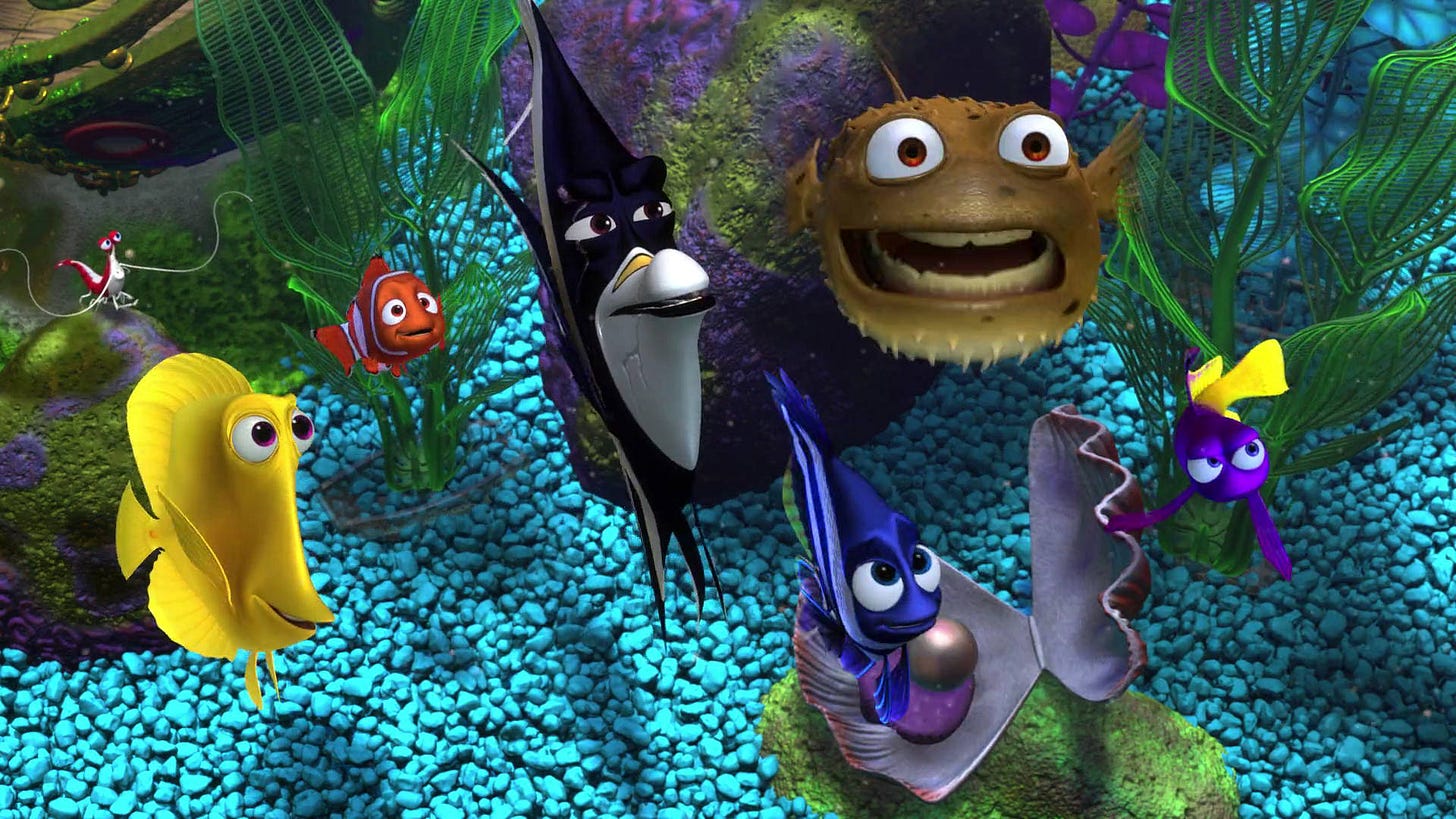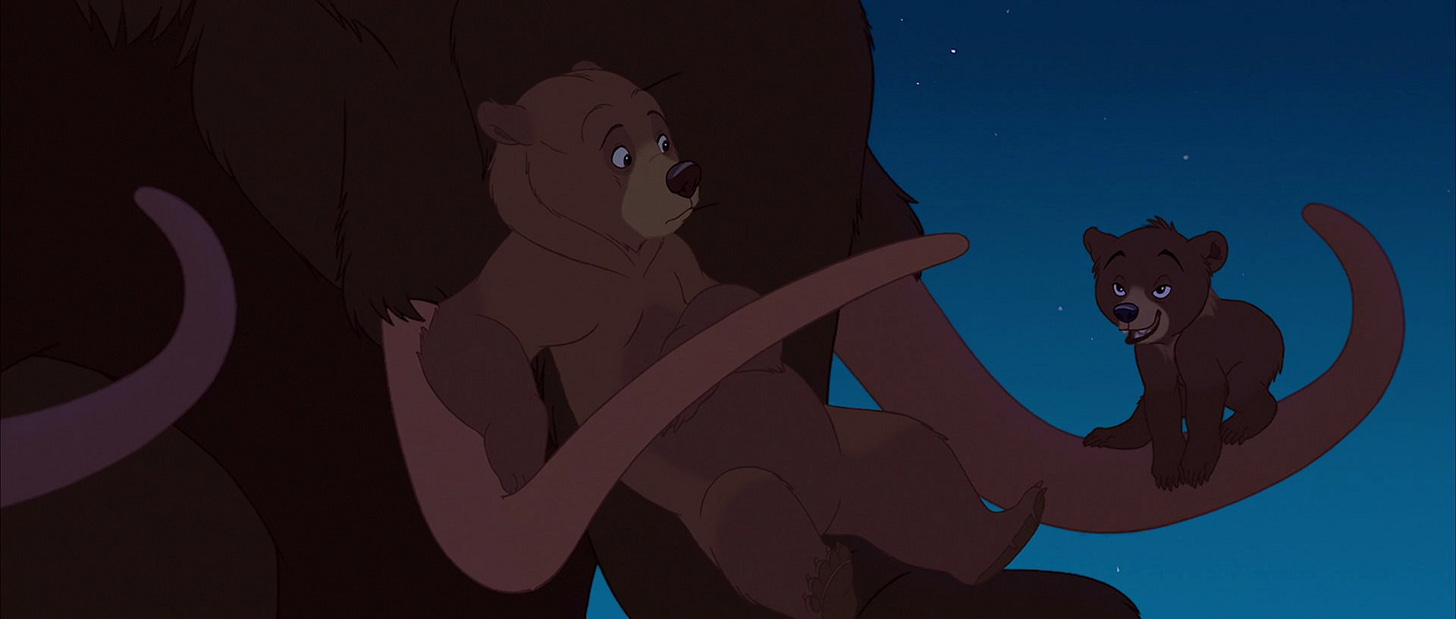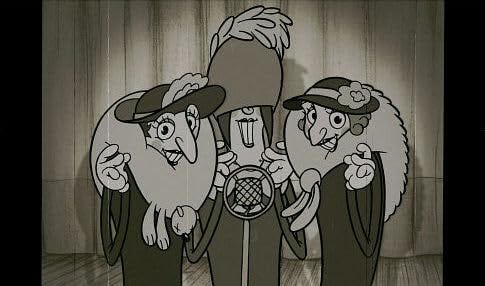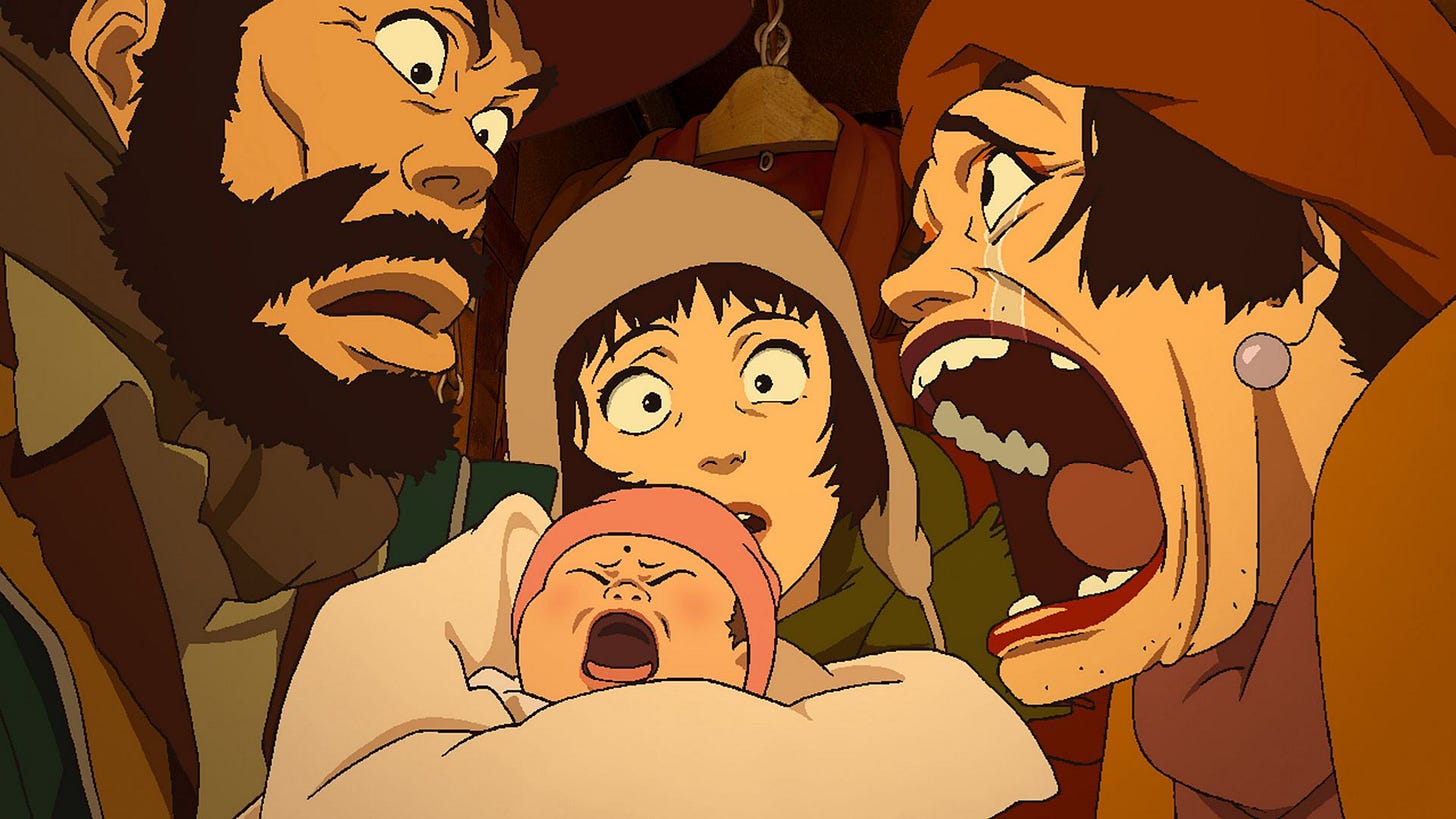Better Animated Feature: 2003
Pixar finally won the Pixar Award. Did they deserve it?
This post may be too long for email. We recommend clicking through to the website for the best experience.
Nik: 2003 marked the start of Pixar domination in the Best Animated Feature category. While the studio has had some incredibly well received films that ended up winning, some critics attribute their accolades at least in part to name recognition. As the studio’s first winner, Finding Nemo may have preceded that bias, but was it deserving of the award this year?
The first contender is Brother Bear, an animal-centric movie by what is now Walt Disney Animation Studios. This movie would be the last nominated feature from the studio for a long five years until Bolt followed in 2008. An odd choice, Joaquin Phoenix voices the main character in what is his only animated film to date. When cast, he said:
“Oh, but forget the Oscar nomination (for Gladiator). The real pinnacle is that I’m playing an animated character in a Disney film. Isn’t that the greatest? I play a Native American transformed into a bear. It’s called The Bears. Don't call me a leading man. I don’t care about that. I’m a leading bear. I am content!”
It’s hard to take away his true excitement but it comes off as a bit sarcastic, which is not a great sign.
The other nominee is yet another foreign film in The Triplets of Belleville. This would mark the first French film to get a nomination. The movie has a very unique animation style but, whereas Spirited Away had a lot more studio notoriety, there is definitely a chance this movie may have struggled to get much consideration for the actual win before being written off.
On paper, this year may look a bit weak in terms of animated features we all remember, but were these two more forgotten films actually more deserving winners? Was there possibly a better movie that wasn’t even nominated? Let’s find out!
The Nominees
Finding Nemo (won Best Animated Feature)
Brother Bear (nominated)
The Triplets of Belleville (nominated)
Hot Wheels: World Race (snubbed)
Tokyo Godfathers (snubbed)
The “Best” Animated Feature: Finding Nemo
Eli: It didn’t take long for Best Animated Feature to gain infamy as “The Pixar Award”. Of the 24 feature films Pixar has released since BAF was introduced, 18 of them have been nominated for the award and 11 have won it. This includes a stretch between 2001 and 2010 in which the studio’s first eight eligible movies were nominated, with six of them winning. If you exclusively got your animation opinions from the Academy, you’d think Pixar was the only studio worth a damn, especially in the aughts.
Of course, everyone else knows that’s not true, but enough people have believed this that it’s clearly hurt the general perception of animation. That’s something this series seeks to rectify, as we’re doing the best we can to recognize the accomplishments of other studios, big and small, lingering in the shadows as a middling Pixar effort takes home the hardware simply for existing.
Sometimes, though…sometimes it’s Pixar’s year.
It’s possible a Pixar movie has never grabbed the popular consciousness quite like Finding Nemo. It was Pixar’s first summer hit (their four previous films were all released in November) and Disney marketed the hell out of it in the months leading up to its release. Those efforts were extraordinarily fruitful, as Finding Nemo became the highest-grossing animated film of all time when all the money was counted.1 Everyone and their mother liked this movie—or, perhaps more correctly, everyone and their father.
Longtime readers will remember that we also reviewed Finding Nemo in our previous animation series, Pixar Pints. Some of us loved it, others were only moderately positive on it, but we all agreed: the character-driven story was precisely calculated to mean just as much to parents as it did to their children. Of course, Finding Nemo wasn’t the first animated film to pull this off (and if Pixar had anything to say about it, it wouldn’t be the last), but combined with the heavy marketing and the loaded voice cast, all the stars aligned for Finding Nemo to become an instant classic. It’s impossible to argue that it wasn’t the most important animated film of 2003.
Does any of this translate to the movie actually deserving Best Animated Feature? Well, I think so. I gave Finding Nemo a 10/10 in Pixar Pints and, having rewatched it for this piece, I stand by that rating today.2
But were there any 11/10s out there? How does the field compare to Pixar’s first winner?
The Other Animated Features
Brother Bear — Nik
Nominated
I’ll be honest: I have a Brother Bear tattoo. This movie is probably my favorite ever from Disney. I don’t think it’s necessarily their best, but as a kid, it’s the one that spoke to me the most. There’s an underrated sad scene that I’m strangely addicted to and I’ve never been able to avoid tearing up when I watch it; if you’ve seen it, you know what I’m talking about. In my eyes, Brother Bear truly is fantastic.
The movie tells the story of Kenai, a young Inuit boy who is transformed into a bear as a consequence of his actions and embarks on a journey of self-discovery and redemption. He learns about brotherhood on a level beyond humanity.
One of Brother Bear’s central themes is the interconnectedness of all living beings, the importance of understanding and respecting nature. The film beautifully portrays the idea that humans are not separate from the natural world, but rather an integral part of it. Through Kenai’s transformation into a bear, the audience is reminded of the significance of empathy, compassion, and harmony with the environment.
Kenai’s transformation forces him to see the world from a different perspective, leading to personal growth and a deeper understanding of himself and his place in the world. His relationship with Koda, a young bear cub he befriends during his journey, plays a crucial role in his transformation and serves as a catalyst for his emotional development.
The film blends traditional animation with CGI. To be honest, I’m not 100% for this blend and could do without the CGI aspects, but luckily, they are not overused.
And the soundtrack, composed by Phil Collins, is definitely underrated. When most people think of a Phil Collins animated movie soundtrack, Tarzan comes to mind, but in my opinion, this soundtrack is easily as good. “On My Way” gets stuck in my head far too often.
Overall, Brother Bear is heartfelt and really demonstrates how we as people are not so different from the animals around us. It should definitely leave everyone with a profound respect for the natural world.
It’s one of my favorite movies. Asked to compare it with almost any other animated film, I would declare it superior. Accolades and all, that includes Finding Nemo.
Verdict: Better Animated Feature
The Triplets of Belleville — Leah
Nominated
The Triplets of Belleville stands out among the nominees we have reviewed so far. It’s not a family-friendly adventure with bright colors, made by a big studio like Pixar or Disney. Instead, its style is based in caricature, with muted colors and narrative elements that are decidedly not family friendly.
After I watched the movie, I was telling Eli how I found the art style uncomfortable to look at. They described the few parts they saw while walking in and out of the living room as “grotesque”, which I think describes it perfectly. That’s not to say it’s bad—in fact, I think it’s far from it. To create a good caricature, an artist needs a good understanding of the anatomy and proportions of the person or thing they’re exaggerating. A lot of artistic skill went into making this movie look so distinct.
Art is ultimately subjective, and making something that looks pleasant isn’t the only possible goal. Sometimes an idea isn’t going to get across in a picturesque Disney style, and I think The Triplets of Belleville’s art style fit the tone the movie was going for. It’s also worth noting that it incorporated 3D elements alongside traditional hand-drawn animation.
Another noteworthy aspect of this movie is how little dialogue it uses. The art, animation, and music do a lot of heavy lifting to convey the story, and the soundtrack is very well done (“Belleville rendez-vous” is a banger). Even without dialogue, The Triplets of Belleville still manages to convey a distinct sense of humor. These elements come together to create a unique cinematic experience.
Is this enough to make it a better animated feature? Comparing this to Finding Nemo in terms of cultural impact and influence, it pretty obviously loses out. And influence isn’t everything, but while The Triplets of Belleville is a good movie that I do think deserved its critical acclaim, I would be hard pressed to call it the better film. It’s unique, but the art style can be off-putting, and I didn’t connect nearly as much with its story as I did with Finding Nemo’s.
Meanwhile, rewatching Finding Nemo, I still found it both funny and touching, despite having already seen it many times in the 21 years since it came out. This was admittedly my favorite Pixar film as a child, and The Triplets of Belleville didn’t inspire me at anywhere near the same level after watching it for this project.
The Academy got this year correct.
Verdict: Not a better animated feature
Hot Wheels: World Race — David
Snubbed
Editor’s note: we’re aware that this movie was not eligible for Best Animated Feature as it was never theatrically released. Let David cook. —Eli
Okay, here’s the thing.
Objectively, this is not a better animated feature. The visuals are, at best, a paltry shadow of some of the other contenders this year, and the lack of A-list talent bleeds through in the voice acting (though it’s admirable work, it’s also lacking any distinctly relatable voices).
My ass was obsessed with Hot Wheels, though, so if you think I didn’t wear this DVD right through playing it, then you’re bananas.
I mean, seriously. Hot Wheels driving fast across extremely appealing landscapes, following an admittedly basic plotline (mad scientist wants energy, evil scientist wants energy, yadda yadda)—but for a six-year-old kid, there was nothing I could have asked for more. I still want a Deora II.
This also comes with the following caveat: I don’t really think Finding Nemo is a good movie. I’ve never particularly enjoyed it, and a recent rewatch for this series only confirmed that lack of love. Eli touched on the reasons why it was the most impactful animated film of 2003, and I can’t really argue on those points—in terms of money and star power, it had it all. But in terms of a movie I’d actually want to watch…well.
Hot Wheels: World Race is one of those movies that, looking back, is lackluster, but has all the heavyweight punch of something you used to love. It’s uncovering a photo that unlocks a memory you’d once forgotten, taking you back to simpler, better times. It might not be better in the aggregate, but in my heart, it’s not a competition.
Verdict: Not a better animated feature
Tokyo Godfathers — Eli
Snubbed
If I had a nickel for every 2003 animated movie set in a major Eastern Hemisphere metropolis on the Pacific Ocean, in which the plot heavily features a band of misfits trying to return a lost child to their parents and all plotlines are resolved through sheer coincidence…
Weirdly specific as that synopsis may be, it serves as pretty much the only similarity between Finding Nemo and Satoshi Kon’s Tokyo Godfathers, a film about three unhoused acquaintances who discover a newborn baby girl in a trash heap on Christmas and spend the remainder of the holiday season looking for her parents.
For the uninitiated, the best way I can think to describe this movie is as the anime equivalent of a Cyanide & Happiness Depressing Comic Week. If you haven’t read Cyanide & Happiness…neither have I for several years, so I don’t know why that analog came to mind first. But, put more simply, when questioning the motivation for nearly any action by any character in this movie, assume the most brutal possible option to be the correct one.
And yet, Tokyo Godfathers is sprinkled with dashes of hope, of optimism for the future of everyone involved, and Kon manages to walk this tightrope in a manner that feels true to life while rarely seeming contrived or unrealistic. It’s an excellently told story, and as I suspect this piece may be the first time some of our readers are even hearing of this film, I don’t want to spoil it.
Though it is an emotional rollercoaster and you definitely need to be in the mood for it, I’d absolutely recommend Tokyo Godfathers. But over Finding Nemo?
Well, there’s one massive advantage Tokyo Godfathers has in this comparison: it’s a much more progressive movie than any American kids’ media ever could have been in the Stone Age that was 2003.
Most prominently, one of the main characters is a transfeminine former drag queen, which…I’m not sure Pixar would get away with that even today, let alone a full generation ago. Additionally, the film challenges our preconceived notions of unhoused people3 and of what counts as a family; the story explicitly hinges on this woman, a 40-something alcoholic man, and a runaway teenage girl acting as a family to support the abandoned child.
While Finding Nemo does kind of incorporate the “non-traditional family” theme with Dory eventually joining Marlin and Nemo, it’s subtle and it’s not a central tenet of the film. You could give the movie credit for starring Ellen DeGeneres, America’s lesbian sweetheart, but the culturally appropriative Mt. Wannahockaloogie scene—definitely less okay today than it was in 2003—pretty much cancels that out.
However, all of this said, as much as I want to make the case for Tokyo Godfathers to win this award, I don’t think it’d be a winning one. In fact, despite liking the movie quite a lot, I would argue that it loses to Finding Nemo in the “Best”, “Animated”, and “Feature” aspects of Best Animated Feature, which is…all of them.
“Best”: Finding Nemo is deeply fulfilling for all ages, both as you’re consuming it and after the credits have rolled; it’s visually appealing, beautifully scored, and just overall fun, while telling a story that makes you think about some very tough aspects of life but ultimately ending in a heartwarming fashion. Tokyo Godfathers is fairly subdued visually and aurally and, though there are fleeting moments of laughter, you will spend most of the movie feeling down and probably not get satisfactory closure by the end. Both styles of movie—of art—have their purpose, but when presented to a general audience, it’s clear which one the majority is going to find superior. Speaking personally, I find myself among that majority, though it’s not a landslide victory in my mind.
“Animated”: What Finding Nemo did with its computer animation was absolutely outstanding for 2003. I obviously don’t mean to denigrate hand-drawn animation or the traditional anime style. Tokyo Godfathers is a well-animated film that includes super expressive characters and a very raw depiction of life on the streets. But I don’t think it’s a hot take to say that any movie would have a tough time measuring up to Finding Nemo, and Tokyo Godfathers just doesn’t.
“Feature”: Finding Nemo was a summer blockbuster—the second highest-grossing film of any kind in 2003, losing out only to The Lord of the Rings: The Return of the King. Meanwhile, Tokyo Godfathers was hastily released in the United States in late December for the sole purpose of being eligible for a nomination for this very award, which it did not receive. It didn’t even get a full English dub until 2020 (which is the version I watched because it’s the one available to rent on YouTube).4
So no, I wouldn’t call Tokyo Godfathers a better animated feature. But I would liken it to either of this season’s national title runners-up:5 incredibly good—transcendent, even—but facing a nearly unbeatable opponent.
Verdict: Not a better animated feature
Running Tally
2001: 2 better (2 nominated; 3 snubbed)
2002: 1 better (4 nominated; 0 snubbed)
2003: 1 better (2 nominated; 2 snubbed)
TOTAL: 4 better (8 nominated; 5 snubbed)
Join us in two weeks when we discuss another classic Pixar win: 2004’s The Incredibles!
Next: 2004 (2 nominated; 1 snubbed)
Even today, it’s still the 10th highest-grossing animated film in North America if you adjust for inflation.
Admittedly, I am a little generous with my 10/10s.
If I may levy one criticism here, it’s that I think the film does prop up the rhetoric that people usually become unhoused as a direct result of their own actions, which I don’t agree with. I don’t think this was intentional, but I am admittedly unfamiliar with how Japan treats its unhoused population in either policy or society. In any case, it doesn’t come across well in the cultural translation from Japanese to English.
I’m still relatively new to anime, so I’m still kinda testing the waters on whether I prefer subs or dubs. So far, subs are winning.
To be clear here, I’m talking about 2024 Iowa women’s basketball and Purdue men’s basketball.











